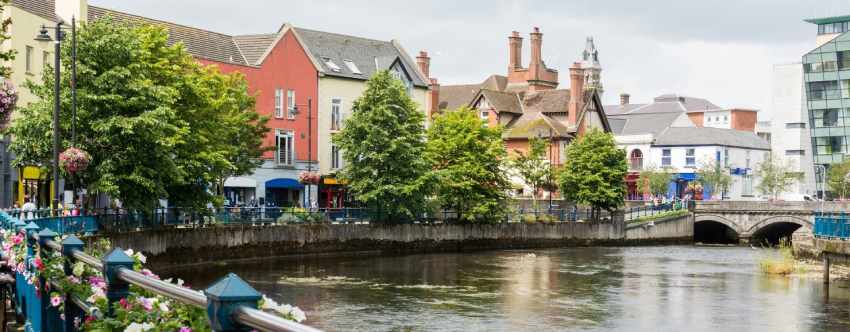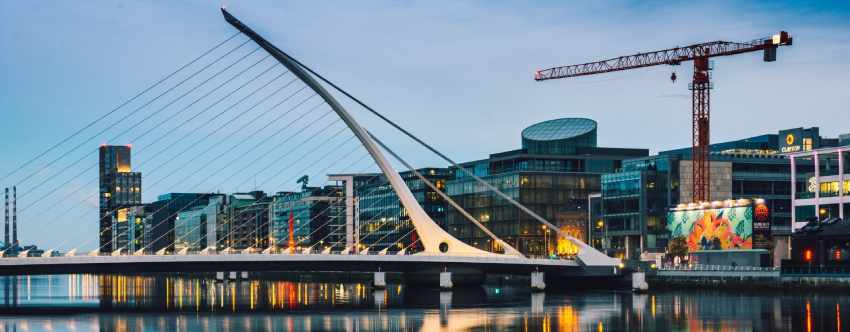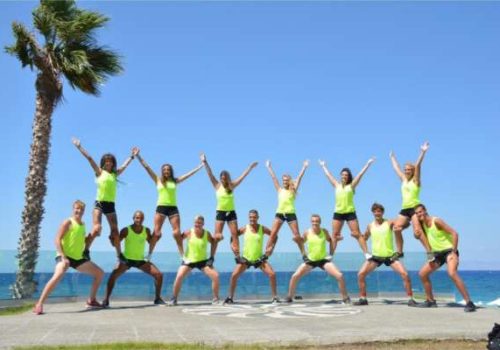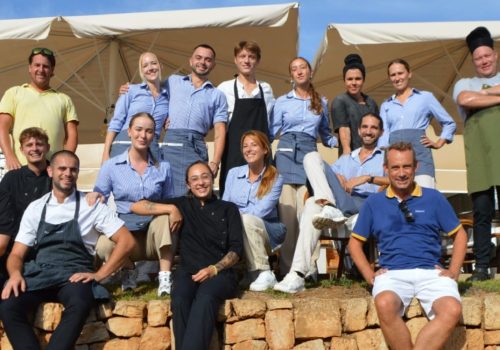Living and Working in Ireland
Information & guidance about seasonal jobs in Ireland
Are you dreaming of living and working in Ireland? With our job offers in Ireland, this dream could soon become a reality for you. The Republic of Ireland, or Poblacht na hÉireann in Irish, has so much to offer its visitors with its picturesque countryside, green hills, wild cliffs, and idyllic villages. On the green island, you will experience a culture shock in the most positive way.
Seasonal jobs in Ireland
We don’t have any jobs matching this search. Below you’ll find a selection of our most popular vacancies!
- Adventure jobs, Hotel jobs, Tourism
- Bulgaria, Croatia, Egypt, Greece, Italy, Spain, Turkey
- Hotel jobs, Tourism
- Cyprus, Greece, Spain
- Tourism
- Cyprus, Greece, Spain
- Hotel jobs, Tourism
- Cyprus, Greece, Spain
- Chef & Cookery, Hotel jobs, Tourism, Waitress-Waiter
- Spain
Dublin, Cork and Kerry as well as other tourist-populated areas offer work in pubs, bars, restaurants and hotels. There are a number of outdoor activity centers throughout Ireland that offer job opportunities for catering staff and activity instructors.
Au Pairs usually need some childcare experience but won’t always need to be able to speak fluent English. Au pairs live with host families, looking after the children and perform basic domestic duties such as cleaning. Wages are often low but food and accommodation is usually included.
Voluntary Job Opportunities In Ireland Include work on farms and summer camps.
Tax Back Can Assist With Claiming Tax Back If You Have Worked In Ireland.
If you intend to visit Ireland, on holiday, a business trip, to study, work, volunteer or as an emigrant you should get up to date and accurate information from the official website of the Department Of Foreign Affairs Ireland or Irish Naturalization & Immigration Service (INIS)
For up to date information on visa requirements, you can also check with the Embassy or Consulate of Ireland before you travel.
Working in Ireland
Working conditions in Ireland
Working conditions in Ireland have seen significant development and growth since the 1990s, leading to an improved standard of living in the country. The job market has become more modern and innovative, making Ireland one of the countries with the best salaries within the European Union. Surprisingly, although the gross salary in Ireland may be lower than in Germany, the net salary is even higher. However, it is important to note that the cost of living, especially in major cities like Dublin, is correspondingly higher.
Living and working in Ireland offers plenty of enjoyment, thanks to the country’s stunning nature and rich culture. Ireland observes 10 public holidays, with St. Patrick’s Day being one of the most important celebrations. Both Irish and English are official languages in Ireland, making it easy for newcomers to adapt and communicate.
A typical working day in Ireland usually spans from 09:00 to 17:30, with a one-hour break between 12:00 and 14:00. The standard working week consists of approximately 39 hours.
Salary in Ireland
The minimum wage in Ireland is around €1656 per month. Income tax, which depends on the tax class you fall into, accounts for about 20% of this amount. Upon signing an employment contract, it is necessary to apply for a PPS number (Personal Public Service Number) and provide it to your employer. Additionally, you may need to obtain a certificate of tax deduction from the tax office, which will result in a tax credit certificate used to determine your position in the tax system and your tax rate.
In addition to income tax and social security tax, the USC (Universal Social Charge) is also deducted from your salary.
Working in Ireland: Taxes
Understanding the tax system is essential if you plan to work in Ireland. The country operates under a self-assessment model, wherein taxpayers are responsible for calculating and paying their taxes. Each year, taxpayers must submit an annual tax return, due by October 31.
Payroll taxes are employed in Ireland to fund social benefits like unemployment benefits and health insurance. Typically, income tax is deducted from an employee’s salary by the employer.
Ireland boasts a corporate tax rate of 12.5%, one of the lowest in Europe. This attractive rate has incentivized foreign companies to establish their headquarters in Ireland, particularly in Dublin, the capital city. Consequently, there has been a significant increase in foreign investments in the country.
In terms of Value Added Tax (VAT), Ireland imposes a rate of 23% on most goods and services within the country. Additionally, there are stamp duties applicable to certain transactions, such as real estate purchases. Understanding and adhering to Ireland’s tax regulations is crucial for those considering employment in the country.

The Working Culture in Ireland
If you’re considering relocating to Ireland for work, understanding the country’s work culture can be beneficial. Here are some key aspects to keep in mind:
Friendly and Relaxed Environment: The Irish are generally known for their friendliness and easy-going nature, which translates into a more relaxed work environment. Employers in Ireland are often less formal compared to those in Germany.
Emphasis on Teamwork: Collaboration and teamwork are highly valued in the Irish workplace. People tend to work well together and offer support to one another, fostering a positive and cooperative atmosphere.
Work-Life Balance: Ireland is known for its good work-life balance. You’ll find that long working hours are not the norm, and there is ample time for a fulfilling social life outside of work. Weekends are typically dedicated to relaxation and enjoyable activities.
Socializing After Work: It’s common in Ireland for colleagues to head to the pub for a few drinks after work. This social tradition provides an excellent opportunity to meet new people, strengthen relationships, and unwind in a casual setting.
By familiarizing yourself with these aspects of the Irish work culture, you can adapt smoothly to your new professional environment and enjoy a fulfilling experience working in Ireland.
The Irish Labor Market
If you’re considering living and working abroad and have your eyes set on Ireland, it’s essential to be familiar with the country’s main sectors, as these are where you’re most likely to find job opportunities. Here are the key sectors in Ireland:
Agriculture
Despite being one of the smallest countries in Europe, Ireland holds significant importance in the global agricultural industry. Its mild climate and fertile soil create an ideal environment for agricultural activities. Agriculture contributes to approximately 4% of the country’s GDP.
Tourism
Ireland is a beloved tourist destination, with tourism contributing around 5% to its GDP. The country’s captivating landscapes, warm hospitality, and rich historical heritage attract visitors from all corners of the globe.
Industry
Ireland boasts a robust industrial sector, accounting for approximately 15% of its GDP. The nation is home to numerous multinational corporations, with giants like Intel and Pfizer being prime examples.
Technology
The technology sector is experiencing rapid growth in Ireland, now constituting around 6% of the GDP. The country hosts a plethora of innovative startups and world-renowned tech companies. There is a consistent demand for multilingual customer service representatives in this sector.
These key sectors not only contribute significantly to Ireland’s economy but also present exciting employment opportunities for both locals and those looking to move to the country. Whether you have a passion for agriculture, an interest in the bustling tourism industry, an inclination towards manufacturing and industry, or a flair for the ever-evolving tech field, Ireland has something to offer for everyone seeking new adventures in the Irish job market.
Jobs in Ireland: Popular Professions and Opportunities
Ireland has captivated the interest of German tourists and professionals in recent times, owing to its diverse landscapes, welcoming ambiance, and attractive employment prospects with competitive pay scales for skilled workers. If you possess relevant qualifications in IT, healthcare, or telecommunications and are proficient in English, you are likely to find job opportunities in Ireland relatively quickly.
Some sought-after jobs in Ireland include accountants, consultants, engineers, HR managers, IT professionals, marketing managers, and finance managers. Another in-demand profession is that of an account manager, as many multinational companies based in Ireland seek customer service representatives proficient in multiple languages, including German.
In Dublin, there is a significant demand for nurses, and the Irish government has taken steps to address the shortage of healthcare professionals. As a nurse, you may find employment prospects readily available.
Working on Farms in Ireland
Ireland’s unique landscapes, extensive agricultural practices, livestock and horse farming, and rich cultural history make it a popular destination for farm work. The Irish are renowned for their warm hospitality, and joining an Irish farming family provides an excellent opportunity for gaining work experience abroad and improving English language skills.
However, it is crucial to understand that working on an Irish farm is not akin to a farm holiday. The work involves early mornings, laborious tasks, sore muscles, getting dirty, braving inclement weather, and occasionally working overtime – all part of the adventure of living and working on a farm in Ireland. If this sounds like an exciting and rewarding experience to you, then farm work in Ireland may be a perfect fit.
Many individuals choose farm work for various purposes, such as sabbaticals, gap year trips, internships abroad, volunteer work, or work & travel opportunities.
Health Insurance in Ireland
Residents of Ireland have access to health care through the Health Service Executive (HSE), which operates an excellent public health system in the country. The healthcare system in Ireland is primarily based on residency and income rather than taxes or Pay-Related Social Insurance (PRSI). Anyone classified as an Ordinary Irish Resident by the HSE, irrespective of nationality, is entitled to healthcare services.
If you are “ordinarily resident” in Ireland and intend to stay for at least a year, you can apply for a Medical Card. To qualify for a health card, your weekly income must be below a certain threshold based on your family size.
Upon arrival in Ireland, you will need to provide the HSE with your employment contract or rental agreement to establish your usual residence. Public healthcare in Ireland encompasses primary care, emergency care, maternity care, hospital services, and more. There are two categories of healthcare in Ireland: Category 1 for those with a health insurance card and Category 2 for those without. Your eligibility for the health card scheme depends on your income and means, and you are most likely to fall under Category 2, where various medical services are available.
Voluntary work in Ireland
As the capital and economic and cultural hub, Dublin offers a bustling city that is packed with opportunities for voluntary work in Ireland. With a rich history dating back to the 9th century reflected in by the medieval castles and cathedrals dotted amongst the one thousand places to grab a pint, that are the center point around which many of the 1.2 million inhabitant’s social lives. Volunteering in Ireland’s capital mainly includes community development and assistance with implementing and supporting social services.
Cork is considered Ireland’s second city; a population of around 400,000 means it offers a smaller alternative to Dublin but packs just as good a cultural and historical punch. Following a hard economic recession, Cork has undergone a transformation; volunteers in Ireland’s southern city will find sparkling waterfronts, coffee shops on every corner but still feel the traditional spirit in the pubs, locals and restaurants dishing up top quality, traditional food.
Galway and Limerick all have smaller populations of around 100,000, making them great locations for voluntary work in Ireland that gives a real insight into smaller city life for the locals. The waterfront towns provide the chance to spend the day lending a helping hand to communities in need, and evening relaxing in a cozy local pub. Rural voluntary locations are also plentiful in Ireland; volunteers interested in environmental preservation will find themselves in Ireland’s endless miles of lush countryside, spending days exploring the natural beauty on offer.
Volunteering projects in Ireland
Voluntary work in Ireland often includes working in community development; education, working with the youth, the elderly and the vulnerable are areas in constant demand and roles can be found all over the country.
Environmental conservation voluntary work in Ireland is also an area growing in need as the country continues to industrialize and grow rapidly in population. This type of work can include developing and contributing to sustainability projects, educating the public about the dangers of pollution and how they can live in an environmentally friendly way. Animal welfare is also a popular choice of volunteer work in Ireland, and volunteers may find themselves working on farms or in animal shelters, and those interested in a veterinary career may assist in basic tasks.
Voluntary work in Ireland can last anywhere from a few weeks to a few months, depending on the project and your availability. The winter months can be rainy, but there is no promise of sunshine in the summer either, so embrace whatever the weather throws at you, soak up the culture alongside the rain and roll your sleeves up to get volunteering!

Living in Ireland
Accommodation in Ireland and Housing Costs
When it comes to accommodation in Ireland, the monthly rental costs can vary significantly depending on the region. For instance, in a coastal city like Cork, renting an apartment in the city center may average around €1,366 per month, while in Dublin, the prices can be a few hundred euros higher.
To tackle the challenge of high rents and housing expenses, shared apartments in spacious houses have become increasingly common, providing a pleasant solution for many. If you’re considering moving to Ireland, we’d be delighted to assist you in finding your ideal apartment.
To begin your apartment search in Ireland, take a look at the following websites, where you might have the good fortune of discovering your new home:
These websites offer an array of housing options, and with some luck, you’ll find the perfect place to call home in Ireland. Happy hunting!
Transportation in Ireland
In Ireland, the primary bus company is Bus Éireann, while the train services are operated by Iarnród Éireann. The train network offers excellent connections to various cities across the country, making it a convenient and efficient mode of transportation.
To make public transport more affordable, there are several discount cards available. Notable options include the Irish Explorer and the Open Road Pass. The Irish Explorer offers eight days of unlimited travel on Eireann buses and trains for just €245 for two weeks, or around €60 for three days.
Food in Ireland
Ireland’s culture, renowned for its creativity, humor, and hospitality, attracts many to seek summer or holiday jobs in the country. The picturesque contrast of lively folk music in cozy pubs against ancient ruins, collapsed churches, and abandoned castles left by the Vikings, Normans, and English in the distant past adds to the charm.
The quintessential Irish pub, a center of social life, is where people gather after work to share thoughts, sing, dance, and enjoy a pint of the famous Guinness beer. The Irish people’s sociable and hospitable nature is evident in their warm greetings, saying “Tá fáilte romhat,” which means “You are welcome.”
Irish cuisine has been heavily influenced by English history. During times of war, potatoes were one of the few affordable foods for the Irish, and they continue to hold a significant place in Irish dishes today. Many traditional dishes revolve around potatoes, such as Irish cottage pots (colcannon), potato pancakes (boxty), shepherd’s pies, cottage pies, and stews with various meats or fish.
A typical meal in Ireland costs between 15 and 19 euros, and a 0.33 liter bottle of coke is around 2 euros. Ireland is also renowned for its alcoholic beverages, including whiskey, stout, cider, and cream liqueurs. Brands like Jameson, Guinness, Magner’s, and Baileys are well-known Irish exports.
Visiting one of the country’s numerous distilleries, such as Bushmills, Jameson, Tullamore Dew, or Connemara, to taste whiskey is an experience not to be missed. If you appreciate these culinary delights and beverages, you’ll undoubtedly fall in love with the flavours of Ireland!
Nightlife in Ireland
The Irish have a penchant for revelry and indulgence, making the nightlife scene in Ireland vibrant and lively, particularly in Dublin. If you’re eager to experience authentic Irish food, music, and dancing, you’ll be spoilt for choice! Pubs are scattered throughout the country, and nightclubs are aplenty. For an unforgettable night out, Temple Bar in Dublin is the go-to destination, while Dawson Street boasts some of the city’s most exclusive spots.
Belfast’s nightlife offers a delightful blend of old-world charm and modern delights. You can find a great mix of traditional Irish pubs, craft beer establishments, and trendy cocktail bars.
Across the island, countless pubs play host to talented musicians every week. Embrace the true Irish spirit as you relax with a pint of the finest Irish brew, immersed in the enchanting sounds of traditional Irish music. Whether you’re in a lively city or a cozy village, the pub culture in Ireland is sure to leave you with cherished memories of unforgettable nights.

Healthcare in Ireland
Ireland’s healthcare system is modern, safe, and among the best in the world, but it may not be characterized by luxury. In hospitals, for instance, you may find dormitory-style rooms with around 30 beds. Similar to other places, Ireland also experiences long waiting times for medical treatments. However, this issue can be alleviated by opting for private health insurance in addition to public coverage.
Nearly half of the Irish population avail themselves of this option. Some examples of private insurers include VHI Healthcare, Laya Healthcare, Irish Life Health, and HSF Health Plan. The average cost of private health insurance is around €1,000 for adults and approximately €500 for children.
Highlights of Ireland
Dublin, the small yet vibrant capital of Ireland, exudes a unique and charming beauty with its castles, parks, small museums, and abundance of pubs. Due to favorable tax rates, many international companies, including software firms, have established their customer service and call centers in Dublin, leading to a plethora of job opportunities in the city. Not only do companies benefit from the advantageous tax rates, but employees also reap the rewards.
If you ask the locals, they often agree that Cork is one of the most beautiful places in the world. This lively city sits elegantly in the middle of the River Lee, with Cork Harbor ranking as the second-largest natural harbor globally, just behind Sydney. The city’s distinctive flair is undoubtedly influenced by its numerous cafes and pubs, where you might have the chance to savor Cork’s unique sense of humor. Quirky museums and art galleries further add to the city’s distinctive charm. Living in Cork, you are likely to come across the myth of the Blarney Stone, which suggests that kissing the stone while leaning backward and holding onto iron bars grants one the gift of eloquence and persuasion. Whether you believe in such myths or not, Cork is undeniably worth a visit!
Galwayians are true connoisseurs. Live music fills the air from every colorful pub in this creative and vibrant city, and there’s no shortage of festivals and events throughout the year. The weekends in Galway are characterized by a lively party atmosphere, with great bars and delectable restaurants ready to cater to your enjoyment. As an important port city, you can indulge in delicious seafood dishes here. After work, you can look forward to a cozy evening in one of the many pubs. Don’t be surprised if you come across a significant number of students during a stroll by the fresh sea air, as they make up a quarter of the city’s inhabitants! Besides its captivating history, Galway also offers a modern atmosphere. No wonder it is referred to as the “City of Equals,” as respectful interaction among its residents is highly valued. You’ll also encounter diverse cultures, making Galway a melting pot of experiences.








